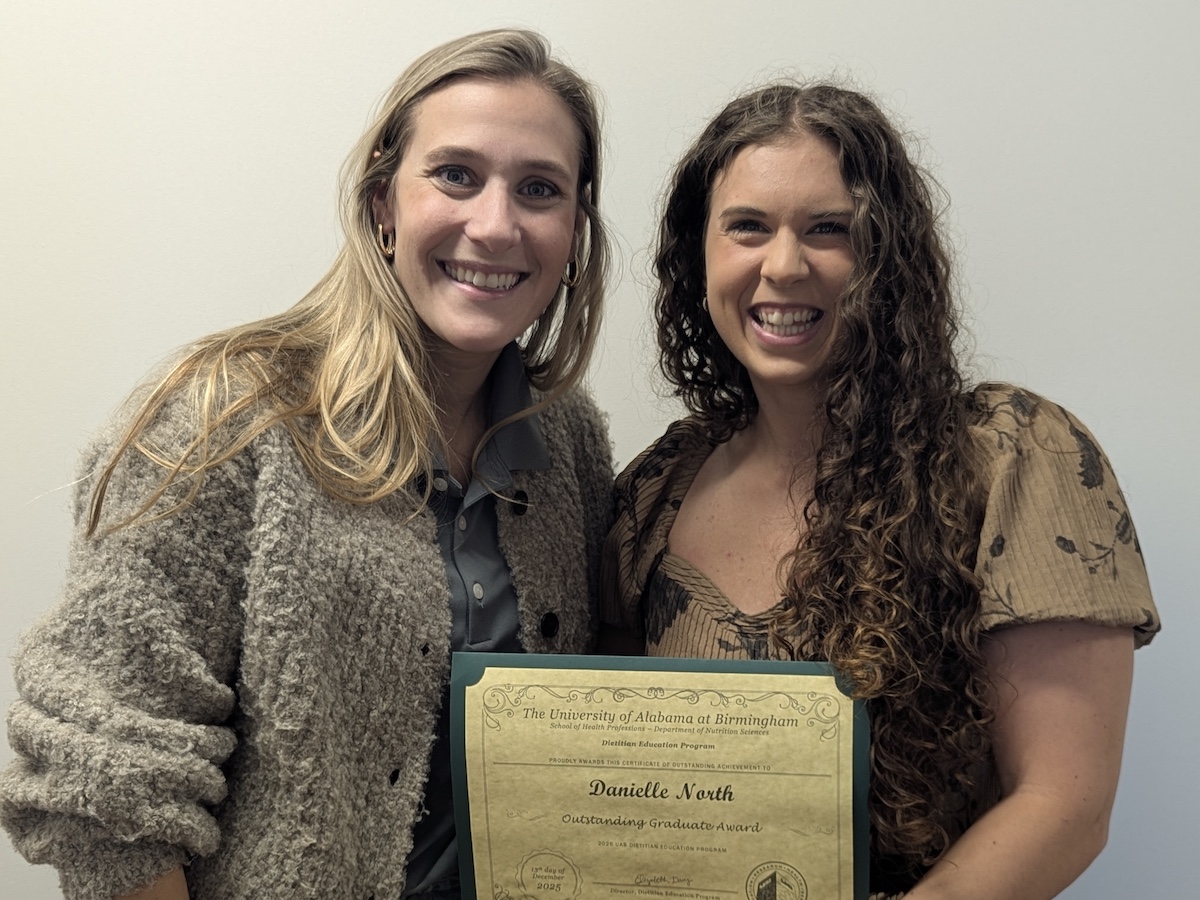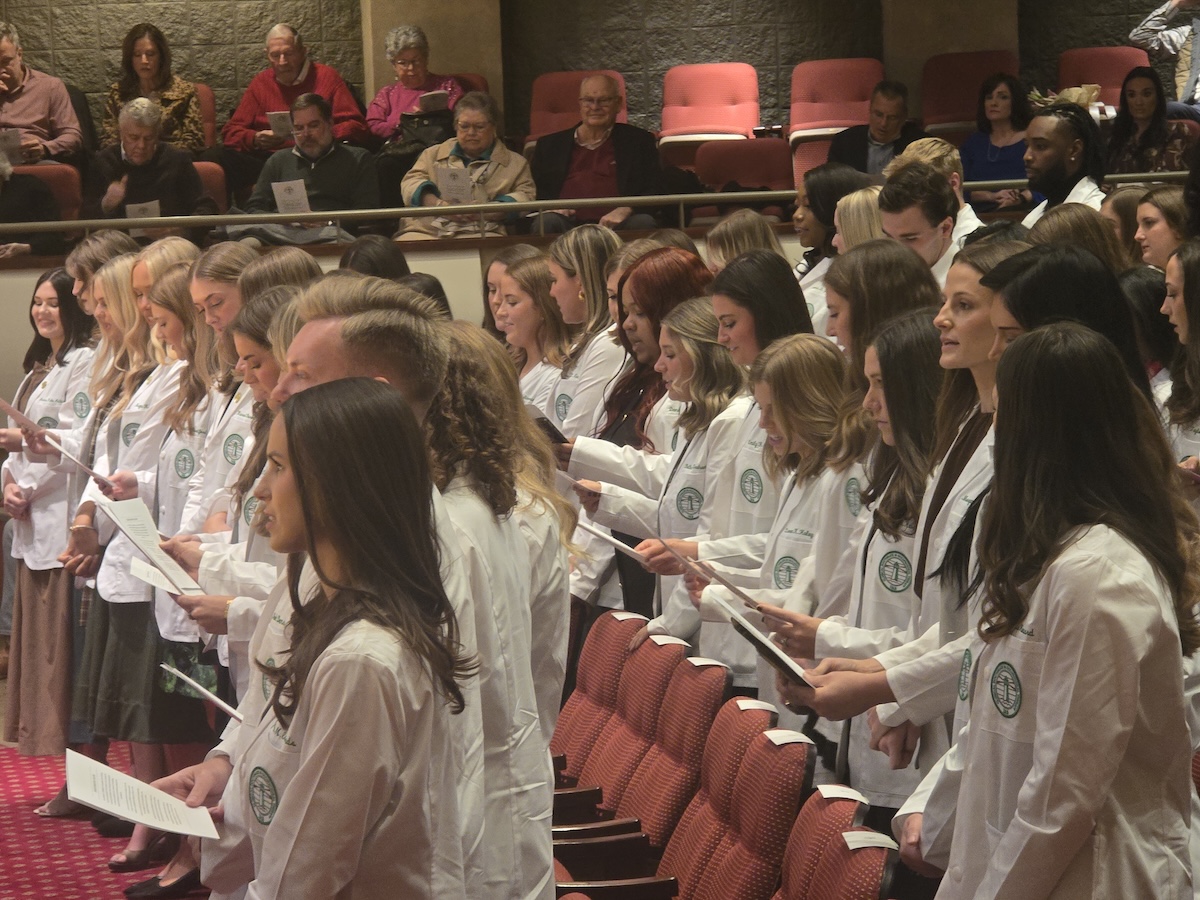Administration-Health Services (Health Informatics Track) Ph.D. Candidate, Heather D. Martin, talks about her interests in helping Alabama practitioners battle the opioid crises, UAB’s Learning Health System, and advocating for student success.
After ten years of working in financial information systems and big data reporting for the U.S. Navy and then in the financial services sector, Heather D. Martin decided to pivot her skills toward earning a PhD in Administration-Health Services on the Health Informatics track in UAB’s School of Health Professions in hopes of finding a more direct way of helping others.
Inspired by her mother, Sue H. Duran, RPH, MS, PhD, DICVP, a professor, pharmacist, and researcher at Auburn University who taught veterinarians about the opioid crisis for many years, and the toll that substance use disorder (SUD) has taken on her family members and Alabama, Martin decided early on as a PhD student to focus much of her research around SUD and pain management.
“My family is historically from Jasper in Walker County, Alabama, the most impacted county in the state for drug abuse. And my husband, who is from Pinson, Alabama, lost his entire immediate family from drug abuse. That is what drives my interest in finding ways to help practitioners prevent and treat SUD; to be able to help others in my state and community,” said Martin.
Early in her PhD program, Martin started attending several SUD and pain management group meetings at UAB. “I realized that these different groups around campus were working on different areas of SUD and pain management, and I started regularly attending as many I could to try to see the big picture and the common barriers our Alabama practitioners are facing around SUD,” said Martin.
Martin’s knowledge and passion in this area created the opportunity to be the project lead of Alabama Health Professional’s Opioid Pain Management Education (ALAHOPE) under the direction of Sue Feldman, RN, MEd, Ph.D., Professor and Director of the UAB Graduate Programs in Health Informatics, and Darlene Traffanstedt, MD, Medical Director at the Jefferson County Department of Health (JCDH).
The joint project, now in its third year, focuses on creating a free, statewide, online, interprofessional SUD and pain management curriculum for Alabama health professional students who have the potential to prescribe controlled substances after they graduate. The curriculum is also being scaled for free CME credit.
“It’s a large, complex project, and the ALAHOPE team could not plan and create the content without the help from its stakeholders including the Alabama Opioid Prescribers and Dispensers Committee along with numerous academic representatives and subject matter experts across the state,” said Martin. We plan to complete the SUD curriculum by the end of 2022 and the pain management piece in 2023.
Martin’s dissertation research focuses on evaluating Prescription Drug Monitoring Program (PDMP) electronic health record (EHR) integration’s impact on opioid prescribing at UAB. After starting the project, Martin began to see the difficulty of obtaining and transforming some types of health system data for research purposes. After voicing her concerns at UAB’s first Learning Health System Month webinar series and demonstrating a passion for continuous improvement and connecting the health system to research, Martin was chosen in 2022 as the Inaugural Learning Health System (LHS) Fellow under the direction of Allyson G. Hall, Ph.D., UAB Professor and Director of Graduate Programs in Healthcare Quality and Safety.
“It’s just logical to me, to connect continuous improvement healthcare initiatives to research. UAB LHS’s goal is to bi-directionally help connect research to practice, and I am honored and excited to be a part of this team,” said Martin. She and Hall have been working with UAB’s Clinical Practice Transformation Team to help disseminate their 3DPS™ continuous improvement process and will be working with them in the coming months to help evaluate and disseminate UAB’s ED Redesign Project.
Martin admittedly struggled with meeting her potential earlier in her career and is candid about the mistakes she made along the way. As an advocate for student success, she works hard to help other students find their way and not repeat her mistakes. For example, through the Healthcare Information and Management Systems Society (HIMSS), she served 3 years as the Student Liaison for the Alabama chapter, where she helped connect Alabama students interested in health IT to scholarships, education, and networking opportunities. Last fall, Martin chaired the first HIMSS Gulf Coast Chapters (GC3) Conference Student Poster Competition in Mobile, Alabama, opening professional development opportunities for health IT students in Alabama, Mississippi, and Louisiana. She joined the newly formed UAB HSA PhD Student Professional Development Committee earlier this year. “We are spending 4 or more years here as PhD students, and this committee wants to do everything possible to maximize our investment and see our PhD students succeed,” said Martin.
Martin was also selected as one of 10 global recipients to participate in the 2021-2022 HIMSS Emerging Healthcare Leaders Program where she received nine months of professional development and leadership training and support, complimentary access to HIMSS Healthcare IT Foundations Course and the CAHIMS™ Exam, and a fully paid trip to HIMSS22 in Orlando to attend the Professional Development Symposium and the Emerging Healthcare Leaders Workshop and Reception. “This program was exactly what I was looking for to grow my leadership and professional development skills, and I feel more prepared to start my academic job search journey this fall,” said Martin.
“I am so grateful to HIMSS, the HIMSS AL Chapter, UAB Medicine, the Center for Outcomes and Effectiveness Research and Education (COERE), the Center for Clinical and Translational Sciences (CCTS), UAB’s School of Health Professions, and JCDH for these opportunities as a PhD student,” said Martin.

